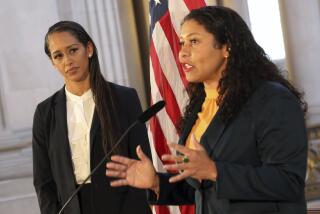Thornburgh Opposes Bennett Drug Fight Plan
- Share via
WASHINGTON — Atty. Gen. Dick Thornburgh, in an apparent split with drug czar William J. Bennett, has expressed strong reservations about shifting federal law enforcement agents into the District of Columbia to help reduce the city’s soaring murder rate.
The Justice Department’s position, expressed by a top Thornburgh aide Tuesday, poses a potential threat to one of the central elements of Bennett’s plans to aid the city--the creation of a special federal-local task force that would use the agents to arrest large numbers of drug dealers.
Bennett and other officials Tuesday strongly denied reports that the Bush Administration, as part of its plan for the city, is considering bringing in the National Guard to control street violence. But as an alternative to using federal troops, Bennett aides have been considering shifting federal manpower, including agents from the FBI and the Drug Enforcement Administration, to work with city police on controlling drug violence.
‘Shock Treatment’
Bennett aides said last week that such a move may be necessary to administer what they have described as “shock treatment” to the city’s drug-infested neighborhoods. They have suggested that such bold and dramatic action is necessary to calm city residents and help restore order.
That possibility, however, has encountered strong opposition from the Justice Department, including senior FBI and DEA officials. These officials have argued that shifting manpower into the city would represent a major shift in federal anti-drug strategy, which has traditionally targeted large drug traffickers, relatively few of whom are directly involved in the District’s thriving street trade in crack cocaine--the drug almost entirely responsible for the city’s skyrocketing number of murders.
David Runkel, a top aide to Thornburgh, said Tuesday that FBI and DEA agents were “trained for major drug trafficking and money-laundering cases . . . not for handling street crime.”
Meanwhile, Bennett aides and White House officials all but ruled out the idea of calling in the National Guard--a move that some officials said was impractical because of legal restrictions on the military’s making police arrests.
“It is not something that is in the works. . . . It’s certainly nothing that we’ve considered a live option,” Bennett said.
More to Read
Sign up for Essential California
The most important California stories and recommendations in your inbox every morning.
You may occasionally receive promotional content from the Los Angeles Times.










